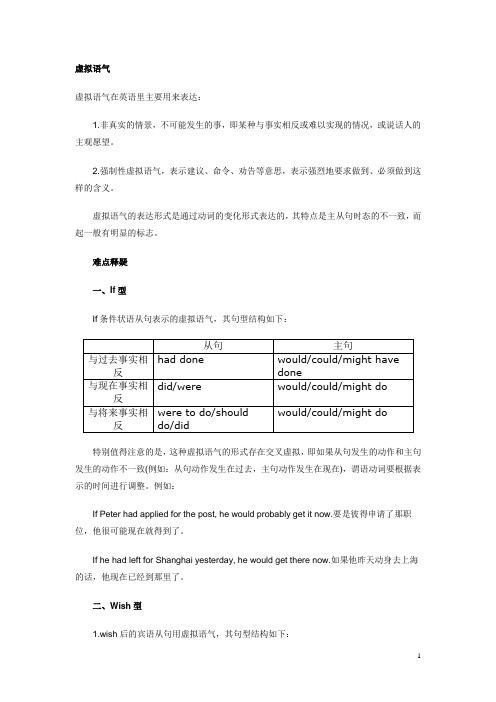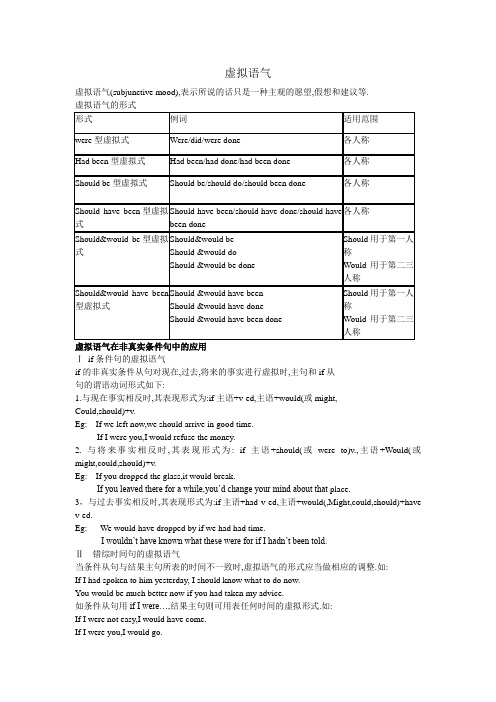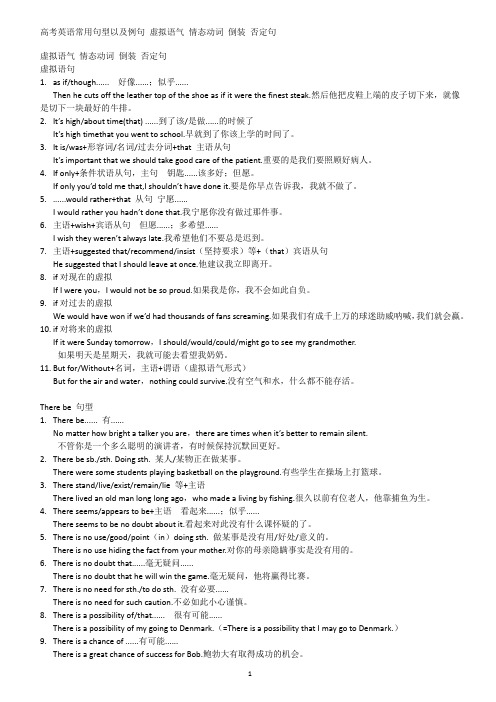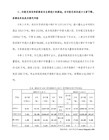虚拟语气、倒装句型
语法:虚拟语气和倒装句

虚拟语气虚拟语气在英语里主要用来表达:1.非真实的情景,不可能发生的事,即某种与事实相反或难以实现的情况,或说话人的主观愿望。
2.强制性虚拟语气,表示建议、命令、劝告等意思,表示强烈地要求做到、必须做到这样的含义。
虚拟语气的表达形式是通过动词的变化形式表达的,其特点是主从句时态的不一致,而起一般有明显的标志。
难点释疑一、If型If条件状语从句表示的虚拟语气,其句型结构如下:特别值得注意的是,这种虚拟语气的形式存在交叉虚拟,即如果从句发生的动作和主句发生的动作不一致(例如:从句动作发生在过去,主句动作发生在现在),谓语动词要根据表示的时间进行调整。
例如:If Peter had applied for the post, he would probably get it now.要是彼得申请了那职位,他很可能现在就得到了。
If he had left for Shanghai yesterday, he would get there now.如果他昨天动身去上海的话,他现在已经到那里了。
二、Wish型1.wish后的宾语从句用虚拟语气,其句型结构如下:与过去事实相反wish that 从句的谓语动词用had done与现在事实相反wish that 从句的谓语动词用did与将来事实相反wish that 从句的谓语动词用would/could do例如:I wish they would change the menu.他们要是改变一下菜单就好了。
I wish I hadn’t spent so much money.我要是没花那么多的钱就好了。
同样地,在as if/as though引导的宾语从句中和以if only引导的带有感叹色彩的虚拟语气句子中,谓语动词与wish引导的宾语从句中的虚拟形式相同。
2.由if only 引导的虚拟语气与过去事实相反if only 谓语动词用had done与现在事实相反if only 谓语动词用did例如:If only she had asked someone’s advice! 她要是征求了别人的意见就好了!3.由as if/as though 引导的虚拟语气与过去事实相反as if/as though谓语动词用had done与现在事实相反as if/as though谓语动词用did例如:He talks about Rome as if he had been there himself.谈论起罗马来就像他去过似的。
虚拟语气

If it snowed/were to snow/should snow tomorrow,we could change our plan.
如果明天下雪,我们会改变计划。
将来
二、虚拟语气的倒装形式
1)If it had not been for your help,we would never have been able to get out of trouble. → Had it not been for your help,we would never have been able to get out of trouble. 2)If it should snow tomorrow,we would put off our trip. → Should it snow tomorrow,we would put off our trip. 3)If I were you,I would buy that car. → Were I you,I would buy that car.
他立刻去老师的办公室很有必要。
增:
现在的事实 If it were not for the fact that you are ill,I would ask you to do this right now.
如果不是你病了,我会让你立刻做这件事。
If he had followed my advice,he wouldn’t 过去 have lost his job.
如果他听了我建议,他不会失去他的 工作。
情况3:与将来事实相反
If sb. did/were to do/should do …,sb. would/could/might do.
虚拟语气倒装讲义

Ⅴ虚拟语气在in case,lest或for fear that等从句中的用法
in case,lest或for fear that引起的从句常用虚拟语气,表示“以防,以免”,形式为should+动词原形,should通常不能省略.
1.I finally got the job I dreamed about.Never in my life___
so happy!(2000,spring)
A did I feel B Ifeel C I had felt D had I felt
2.The old couple have been married for 40 years and never once__with each other.(2003)
主语+be+adj.+that+主语+should+动词原形
主语+be+adj.+that+主语+should have+过去分词
Eg :I am happy that he should agree.
I am ashamed that you should have done such a thing.
Eg :He took his raincoat with him in case it should rain.
The young driver looked over the engine carefully lest it should go wrong on the way.
Ⅵ虚拟语气在形容词短语的that宾语从句中的应用
(完整版)虚拟语气倒装(讲解+练习)

虚拟语气有些条件句是可能实现的,称为真实条件句. 虚拟语气是动词的一种特殊形式,用来表达说话人的意愿.请求,设想,等未能或不可能实现的事实,或说话人看来实现可能性很小的情况.做这类题时首先要弄清楚虚拟语气的各种句型,即由if引导的虚拟条件句,省略if的倒装形式,可跟虚拟语气的宾语从句,同位语从句,表语从句的句型,以及表示祝愿或感叹的句子和由without, but for等介词引导的短语或句子.主要用法1). 主语从句,同位语从句中虚拟语气的用法.2). 宾语从句中虚拟语气的用法,尤其是wish 虚拟语气结构的用法.3). If条件句中虚拟语气的用法,应特别注意省略if的倒装结构是考试的重点.4). would rather(=wish)等结构中虚拟语气的用法.5). if only(如果。
就好了)结构中虚拟语气的用法.6). But, or, otherwise 等含蓄条件句的用法.7). It’s time (that)(早该。
)等结构中虚拟语气的用法.1. 虚拟语气在虚拟条件句中的运用(1) 虚拟语气现在时,用以表示与现在/将来事实相反的假设或现在实现可能性不大的情况.Eg. If I were a bird, I would fly to you.If it is not for their help, we shall be in a very difficult position.If it were not for their help, we should be in a very difficult position.If I had seen the film, I would…..(2) 虚拟语气过去式. 表示与过去事实完全相反的假设.Eg. If we had started earlier, we should not have missed the train.If she hadn’t been ill, she might have come.If she were not ill, she might come.◆书面语中,如果从句里含有should, had, were或其他助动词,则可将从属连词if省去,将助动词.情态动词.be或have放在句首形成部分倒装.Eg.Were he in your position,he’d do the same.If he Were in your position,he’d do the same.Had I had time, I would have done that yesterday.If I Had had time, I would have done that yesterday.If he Should (万一)come tomorrow, I should give him the dictionary.(3) 虚拟语气在某些从句中的应用.A)在(表现了说话人的愿望)wish, suggest, order, demand, propose,command, request, recommend, require, decide, insist, desire,urge等动词的宾语从句(should:应该) + 动词原形.以及would rather /sooner that后要用“ (should:应该) + 动词原形” 来表示愿望,建议,命令,要求等;由上述动词派生或转化的名词suggestion, proposal, plan,motion, recommendation, demand, order, desire, request,requirement, insistence, advice, decision , obligatory(义不容辞的,必须的同位语从句或表语从句中也要用相应的虚拟形式.Eg. His suggestion was that we (should) go at once.Wang insisted that we go at once.B)在It is/was + 某些形容词 + that (表现了说话人的愿望)从句的句型中,that从句中的谓语动词常用虚拟语气,即“should + 动词原形”这些形容词有:important, necessary, essential, imperative, natural, strange,advisable, desirable, possible, probable, astonishing,surprising, desired, suggested, requested, recommended,ordered, proposed, decided, moved等.C) “ should(居然/竟然) + 动词原形(或完成形式)” 可表示惊奇,遗憾,怀疑,不满等.ⅰ. 用于expect, believe, think, suspect 等动词的否定或疑问形式后的宾语从句中.Eg. I never expected that the new apartment should be so small.ⅱ. 用于“It is a pity, it is a shame, it is no wonder 等+ that”等结构后的主语从句中.Eg. It is a pity that he should be so careless.D) 在由for fear that, in case, lest 等引导的状语从句中,用“ should (万一)+ 动词原形” 表示“惟恐”的意思.Eg. He handled the instrument with care for fear that it should be damaged.E) 在“ It is (about/ high ) time + that (从句)(早就应该)” 中,谓语动词常用过去式表表示虚拟语气.Eg. It is high time that Chinese people learnt English.F) 在“as if/ as though”(似乎/好像) 引导的状语从句中,谓语动词与wish的宾语从句的虚拟形式相同.Eg. He w ork s with such enthusiasm as if he never knew fatigue. He speaks English as though he were an American.G) 在 look/sound/feel/ seem + as if / as though从句中,当表示真实情况时,用陈述语气; 否则,用虚拟语气.Eg.It seems as if they know each other. (真实情况)It seems as if they knew each other.It seems as though it were already spring. (虚拟语气)H) 用在if only(如果。
高考英语常用句型以及例句-8-10虚拟语气 情态动词 倒装 否定句

虚拟语气情态动词倒装否定句虚拟语句1.as if/though...... 好像......;似乎......Then he cuts off the leather top of the shoe as if it were the finest steak.然后他把皮鞋上端的皮子切下来,就像是切下一块最好的牛排。
2.It’s high/about time(that) ......到了该/是做......的时候了It’s high timethat you went to school.早就到了你该上学的时间了。
3.It is/was+形容词/名词/过去分词+that 主语从句It’s important that we should take good care of the patient.重要的是我们要照顾好病人。
4.If only+条件状语从句,主句钥匙......该多好;但愿。
If only you’d told me that,I shouldn’t have done it.要是你早点告诉我,我就不做了。
5.......would rather+that 从句宁愿......I would rather you hadn’t done that.我宁愿你没有做过那件事。
6.主语+wish+宾语从句但愿......;多希望......I wish they weren’t always late.我希望他们不要总是迟到。
7.主语+suggested that/recommend/insist(坚持要求)等+(that)宾语从句He suggested that I should leave at once.他建议我立即离开。
8.if对现在的虚拟If I were you,I would not be so proud.如果我是你,我不会如此自负。
9.if对过去的虚拟We would have won if we’d had thousands of fans screaming.如果我们有成千上万的球迷助威呐喊,我们就会赢。
英语中最难的语法:倒装虚拟、混合虚拟、含蓄虚拟与跳层虚拟的用法

(4)My advice is that we stay here.(由该动词转换的名词后面的表语从句)
(5)I offered the advice that we stay here.(由该动词转换的名词后面的同位语从句)
(6)I think it advisable that we stay here.(由该动词转换的形容词作宾语补足语,it为形式宾语,真正的宾语从句中使用虚拟语气)
But that the doctor arrived on time that day, they would have been dead.
Given more time, I would have been able to finish the test.
(or, or else, otherwise)
I forget where I read the article, or I would show it to you now. (与现在事实相反)
Mary couldn't have received my letter, otherwise she would have replied before now. (与过去事实相反)
六、名词从句虚拟语气
(1) ask, advise, beg, command, demand, decide, desire, insist, order, prefer, propose, require, recommend, request, suggest, urge等表示命令、要求、建议等含义的动词后的宾语从句中,谓语动词用(should)+动词原形, eg. I suggest / suggested that we (should) go tomorrow.名词从句虚拟语气
英语虚拟语气知识点
英语虚拟语气知识点(经典版)编制人:__________________审核人:__________________审批人:__________________编制单位:__________________编制时间:____年____月____日序言下载提示:该文档是本店铺精心编制而成的,希望大家下载后,能够帮助大家解决实际问题。
文档下载后可定制修改,请根据实际需要进行调整和使用,谢谢!并且,本店铺为大家提供各种类型的经典范文,如演讲稿、总结报告、合同协议、方案大全、工作计划、学习计划、条据书信、致辞讲话、教学资料、作文大全、其他范文等等,想了解不同范文格式和写法,敬请关注!Download tips: This document is carefully compiled by this editor. I hope that after you download it, it can help you solve practical problems. The document can be customized and modified after downloading, please adjust and use it according to actual needs, thank you!In addition, this shop provides you with various types of classic sample essays, such as speech drafts, summary reports, contract agreements, project plans, work plans, study plans, letter letters, speeches, teaching materials, essays, other sample essays, etc. Want to know the format and writing of different sample essays, so stay tuned!英语虚拟语气知识点虚拟语气一般指说话人的主观愿望或假想,是与客观存在相反的事实,或在现实中无法成真的事情或情形。
虚拟语气15种句型
3.as if / as though后的表语或状语从句 (与wish相同)
含义 动 词 形 式
例句
现在 did / were
He looks as if he knew the little girl.
过去 Have done
It appeared as if nothing had
happened.
5.动词形式为(should)+do 的虚拟
2. It’s + adj.+that 的主语从句 (adj: necessary / essential/
important / natural / strange / possible / impossible
eg. It is important that we should attend the meeting.
• 对过去的猜测 • 肯定 must have done • 否定 can / could not have done • 可能 may / might have done
• 本应该做(实际没有做,有责备意思) • should have done • shouldn’t have done • 本来有必要作(实际没有做,不含责
desire 命令:order / command/ 坚持:insist 不管是动词还是名词,不管是主动还是被动
,不管是引导主语从句, 宾语从句, 表语 从句还是同位语从句, 都要用(should) do
5.动词形式为(should)+do 的虚拟
• My suggestion is that we should listen to his opinion first.
It is time that we stopped work and went home.
英语倒装结构和让步状语从句和虚拟语气
英语倒装结构和让步状语从句和虚拟语气最常见的几种倒装结构一:否定词以及含有否定意义的词或词组放在句首。
eg: (1) Never before has our country been as united and peaceful as it is today. (我们的国家从来没有像今天这样团结和祥和。
)(2)Hardly did I finish supper when the door bell rang.(我刚一吃完晚饭,门铃就响了。
)(3)No sooner had I left the room than he came.(我刚出门,他就来了。
)(4)Not until quite recently did I know what had happened.(直到最近我才知道发生的事。
)(5)At no time will China be the first to use nuclear weapons.(中国决不会首先使用核武器。
)二:强调位置、地点的介词短语作状语放在句首时,采用全部倒装。
eg: (1) At the foot of the mountain sprang many new buildings.(在山脚下建起了许多新楼。
)(2)Opposite our building stands a department store.(我们大楼的对面就是百货商店。
)三:Only及其所修饰的状语放到句首时,句子倒装。
eg: (1) Only when flowers bloom together, can spring be considered here. (只有当百花怒放时,才算春天真正来临。
)(2)Only if everybody is present here, can we begin the meeting.(只有人到齐了,会议才能开始。
)四:以here / there / now / then等副词开头,且主语不是代词时句子倒装。
虚拟语气倒装(讲解+练习)
虚拟语气有些条件句是可能实现的,称为真实条件句. 虚拟语气是动词的一种特殊形式,用来表达说话人的意愿.请求,设想,等未能或不可能实现的事实,或说话人看来实现可能性很小的情况.做这类题时首先要弄清楚虚拟语气的各种句型,即由if引导的虚拟条件句,省略if的倒装形式,可跟虚拟语气的宾语从句,同位语从句,表语从句的句型,以及表示祝愿或感叹的句子和由without, but for等介词引导的短语或句子.主要用法1). 主语从句,同位语从句中虚拟语气的用法.2). 宾语从句中虚拟语气的用法,尤其是wish 虚拟语气结构的用法.3). If条件句中虚拟语气的用法,应特别注意省略if的倒装结构是考试的重点.4). would rather(=wish)等结构中虚拟语气的用法.5). if only(如果。
就好了)结构中虚拟语气的用法.6). But, or, otherwise 等含蓄条件句的用法.7). It’s time (that)(早该。
)等结构中虚拟语气的用法.1. 虚拟语气在虚拟条件句中的运用(1) 虚拟语气现在时,用以表示与现在/将来事实相反的假设或现在实现可能性不大的情况.Eg. If I were a bird, I would fly to you.If it is not for their help, we shall be in a very difficult position.If it were not for their help, we should be in a very difficult position.If I had seen the film, I would…..(2) 虚拟语气过去式. 表示与过去事实完全相反的假设.Eg. If we had started earlier, we should not have missed the train.If she hadn’t been ill, she might have come.If she were not ill, she might come.◆书面语中,如果从句里含有should, had, were或其他助动词,则可将从属连词if省去,将助动词.情态动词.be或have放在句首形成部分倒装.Eg.Were he in your position,he’d do the same.If he Were in your position,he’d do the same.Had I had time, I would have done that yesterday.If I Had had time, I would have done that yesterday.If he Should (万一)come tomorrow, I should give him the dictionary.(3) 虚拟语气在某些从句中的应用.A)在(表现了说话人的愿望)wish, suggest, order, demand, propose,command, request, recommend, require, decide, insist, desire,urge等动词的宾语从句(should:应该) + 动词原形.以及would rather /sooner that后要用“ (should:应该) + 动词原形” 来表示愿望,建议,命令,要求等;由上述动词派生或转化的名词suggestion, proposal, plan,motion, recommendation, demand, order, desire, request,requirement, insistence, advice, decision , obligatory(义不容辞的,必须的同位语从句或表语从句中也要用相应的虚拟形式.Eg. His suggestion was that we (should) go at once.Wang insisted that we go at once.B)在It is/was + 某些形容词 + that (表现了说话人的愿望)从句的句型中,that从句中的谓语动词常用虚拟语气,即“should + 动词原形”这些形容词有:important, necessary, essential, imperative, natural, strange,advisable, desirable, possible, probable, astonishing,surprising, desired, suggested, requested, recommended,ordered, proposed, decided, moved等.C) “ should(居然/竟然) + 动词原形(或完成形式)” 可表示惊奇,遗憾,怀疑,不满等.ⅰ. 用于expect, believe, think, suspect 等动词的否定或疑问形式后的宾语从句中.Eg. I never expected that the new apartment should be so small.ⅱ. 用于“It is a pity, it is a shame, it is no wonder 等+ that”等结构后的主语从句中.Eg. It is a pity that he should be so careless.D) 在由for fear that, in case, lest 等引导的状语从句中,用“ should (万一)+ 动词原形” 表示“惟恐”的意思.Eg. He handled the instrument with care for fear that it should be damaged.E) 在“ It is (about/ high ) time + that (从句)(早就应该)” 中,谓语动词常用过去式表表示虚拟语气.Eg. It is high time that Chinese people learnt English.F) 在“as if/ as though”(似乎/好像) 引导的状语从句中,谓语动词与wish的宾语从句的虚拟形式相同.Eg. He w ork s with such enthusiasm as if he never knew fatigue. He speaks English as though he were an American.G) 在 look/sound/feel/ seem + as if / as though从句中,当表示真实情况时,用陈述语气; 否则,用虚拟语气.Eg.It seems as if they know each other. (真实情况)It seems as if they knew each other.It seems as though it were already spring. (虚拟语气)H) 用在if only(如果。
- 1、下载文档前请自行甄别文档内容的完整性,平台不提供额外的编辑、内容补充、找答案等附加服务。
- 2、"仅部分预览"的文档,不可在线预览部分如存在完整性等问题,可反馈申请退款(可完整预览的文档不适用该条件!)。
- 3、如文档侵犯您的权益,请联系客服反馈,我们会尽快为您处理(人工客服工作时间:9:00-18:30)。
语法系列复习专题十-----虚拟语气、倒装句型虚拟语气虚拟语气是通过特殊的谓语动词形式来表达的愿望、假设、怀疑、猜测或建议等语气,它不表示客观存在。
一、虚拟语气在单句中的用法常用来表示祝愿、采用固定的倒装句式。
例如:Long live the People s Republic of China!中华人民共和国万岁!be happy! 快乐!have a good time! 玩得愉快! succeed!成功! make progress! 进步!二、虚拟语气在复合句中的用法:1. 在非真实性条件句与主句中的用法如果我是你,我会接受邀请的。
If I had time,I would go there.如果我有空,我就去那儿。
如果你早点来,你就不会错过那辆公共汽车了。
If he had seen you yesterday,he would have returned your book.如果他昨天见到了你,他就会还你的书的。
例如:If it should rain/were to rain/rained tomorrow,the sports meet would be put off.万一明天下雨,运动会就推迟。
(事实上明天下雨的可能性不大。
)If you dropped/should drop/were to drop the glass,it would break.万一杯子掉下来会打碎的。
4) i f 的省略如果条件句中有were,had,should 等助动词,可将if 省略,而把were,had 或should置于句首,来表达以if 引导的条件句的相同意思。
例如:Should it rain/were it to rain tomorrow,the sports meet would be put off./Had he seen you yesterday,he would have returned your book.5)条件句或主句的省略当有上下文或上下句中的语言环境暗示的时候,表示虚拟语气的从句或主句往往可以省略,以避免重复。
例如:——Why didn t you attend the party yesterday?——I would/should have,but I was too busy then.May you 祝你I was surprised that you didn t like this job.You could have done it better.(后面省略了if you had liked it.)6)混合时间条件句与主句条件句与主句的动作发生的时间有先后之差,应按各自动作时间搭配好相应的结构形式。
例如:If the teacher hadn t been ill yesterday,who could give us a lecture now?/If you had reviewed the lesson,you would answer the question now.7)含蓄条件句与主句即用without(=but for),or(else)代替if 从句。
例如:Without/But for his help,we wouldn t have made such great progress.=If his help,we wouldn t have made such great progress.2.在as if/as though 引导的状语从句中用法:在as if/as though 引导的状语从句中,谓语动词多用倒退一个时间段的方式来表达虚拟语气。
例如:The man speaks as if he were a foreigner./The speaker told us a lot about that country as though he had been there many times./They talked as if they had been good friends for years.注:as if/as though 从句中不一定都要用虚拟语气。
如果情况真实性、可能性很大,就要用正常时态来描绘。
例如:It looks as if it is going to rain.天看起来象要下雨。
(下雨的可能性很大。
)3.在宾语从句、表语从句、主语从句中的用法:1) 在wish 后的宾语从句中的用法:A .与过去事实相反的愿望:宾从谓语为“had done ”形式。
例如:I wish I had passed yesterday s exam.要是我昨天的考试及格了该多好。
B .与现在事实相反的愿望:宾从谓语为“did ”形式。
例如:He wishes he was as clever as you./I wish I had a large room to live in.C .表示将来愿望:宾从谓语用“would/could do ”形式。
例如:How I wish I would go abroad next year!2)在suggest,propose,demand,request,require,order,insist 等动词后的宾语从句中,谓语为“(should) do ”形式。
例如:I suggest/propose/demand/request/require/order/insist that he(should) be sent to the nearest hospital as soon as possible.3)在“It is (about/high) time +that 从句”结构中,that 从句的谓语用一般过去时或“should do ”形式。
例如:It is high time he 他该开始了。
4)在表语从句、同位语从句中的用法:在suggestion,proposal,request,requirement,advice 等名词后的表语从句、同位语从句中,谓语用“(should) do ”形式。
例如:My suggestion is that we (should) send a few comrades to help the other groups./He gave an order that the work be done at once.虚拟语气考点分析1.——Alice,why didn t you come yesterday?——I _____,but I had an unexpected visitor. (NMET)A.hadB.wouldC.was going toD.did析:此题A 、D 明显不合上下文,因为乙方没有去。
B 选项若为would have 则成立,可以理解为I would have come if I hadn t had an unexpected visitor.的简略式。
但此处是would,故应排除。
只有was going to 可得体地表达“我原本打算去的,但是有不速之客造访”这一意思。
there hadn t been we hadn t got started. should start.2.If there were no subjunctive,English ______ much easier. (NMET)A.will beB.would have beenC.could have beenD.would be析:观察题干,可知全句表达的是与现在事实相反的虚拟语气。
故答案为D。
3.The guard at the gate insisted that everybody ______ the rules. (NMET)A.obeysB.obeyC.will obeyD.would obey析:根据insist后的宾语从句谓语要用(should) do形式规律,可定正确答案是B。
4.I wish I _____ you yesterday.A.seenB.did seeC.had seenD.were to see析:此题表与过去事实相反的原望,答案应为C。
5.—— If he _____ ,he _____ that food.—— Luckily he was sent to the hospital immediately. (NMET)A.was warned;would not takeB.had been warned;would not have takenC.wuld be warned;had not takenD.would have been warned;had not taken析:从对话看,是表达与过去事实相反的虚拟语气,故答案为B。
6.Without electricity human life _____ quite different today. (NMET)A.isB.will beC.would have beenD.would be析:without引出一个含蓄条件句,主句表述的是与现在事实相反的虚拟语气,故答案为D。
7.When a pencil is partly in a glass of water,it look as if it _____. (NMET)A.breaksB.has brokenC.were brokenD.had been broken析;放入水中的铅笔看上去是断的,但实际上并非如此,因此是与现在的事实相反,这时as if从句谓语要用一般过去时,故答案为C。
8.You didn t let me drive.If we _____ in turn,you _____ so tired. (NMET)A.drove;didn t getB.drove;wouldn t getC.were driving;wouldn t getD.had driven;wouldn t have got析:观察题干,可知if从句表述与过去事实相反的假设,因此答案只能是D。
9.I didn t see your uncle at the party.If he _____ ,he would have said hello tome.A.would comeB.had comeC.cameD.did come析:观察题目上下文,特别是第二句的主句谓语为 would have said,可知if从句表述的是与过去事实相反的愿望,因此答案为B。
